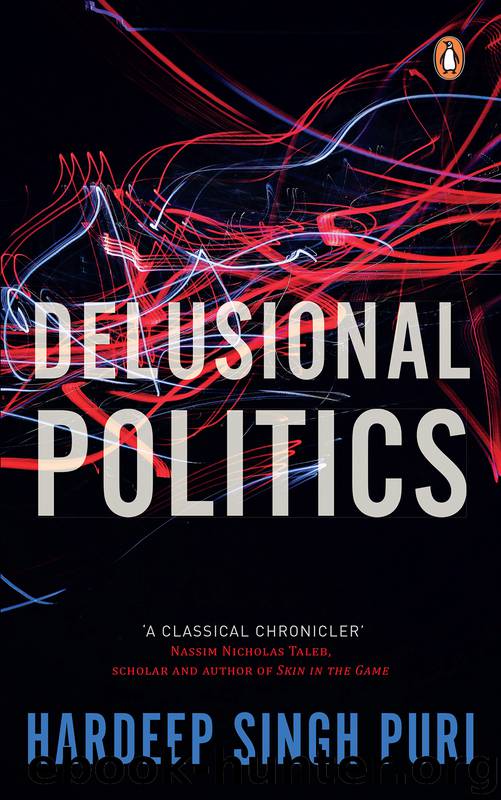Delusional Politics by Hardeep Singh Puri

Author:Hardeep Singh Puri
Language: eng
Format: epub
ISBN: 9789353053765
Publisher: Penguin Random House India Private Limited
Published: 2019-12-31T00:00:00+00:00
June 2017: When Paris Was Lost
Negotiations on climate action, spearheaded by the United Nations Framework Convention on Climate Change (UNFCCC), have exhibited a similar delusional approach from the very beginning and can be summarized as follows: The so-called ‘developed countries’ of the world have industrialized on coal, contributing the most to climate change. These same countries now expect developing nations, who still suffer from large-scale poverty including energy poverty, to renounce coal and find alternate pathways for their development. Moreover, the developed nations don’t want to provide financial or technological assistance in this seemingly herculean task.
At the third UNFCCC Conference of Parties in Kyoto, Japan, in 1997, member nations institutionalized the term Common but Differentiated Responsibility (CBDR). 23 The Kyoto Protocol, as it came to be known, acknowledged the historical responsibility of the developed world towards climate action by drawing up a list of developed countries—then referred to in Annexure 1—which committed themselves to targets for cutting or slowing their emission levels. 24 However, the protocol was hamstrung thanks to a resolution in the US senate according to which Congress would not ratify any international commitment where developing countries were omitted. 25 Thus despite the US signing on to the protocol under President Clinton, it was not ratified by Congress. 26
Up until 2 June 2017, the biggest setback to climate diplomacy came at COP (Conference of Parties) 15 in Copenhagen. The developing world was left bitterly disappointed at the dropping of the global target of reducing emission by 80 per cent by 2050. 27 To make matters worse, the target of limiting rising global temperatures to 1.5 degree Celsius too was dropped. 28
President Obama’s statement that developing countries should be ‘getting out of that mindset’ of looking at previous agreements which made a distinction between developed and developing countries served as a serious blow to developing nations, who had for years tried to uphold the provisions of CBDR and Kyoto Protocol. 29
At the other end of the spectrum, COP 21 at Paris was climate diplomacy’s finest hour in almost two decades. The agreement ticked all the boxes—over 190 signatories, check; 30 mention of not just 2 degree Celsius, but also 1.5 degree Celsius as a target, check; 31 making USD 100 billion the minimum amount and acknowledging that far larger sums are needed for climate action, check; 32 and, most importantly, bringing back CBDR, check. 33
However, the glory days of COP 21 were short lived. On 2 June 2017, Trump withdrew US support to the Paris Accord, claiming he was elected President of the citizens of Pittsburgh and not Paris. He made his contempt for climate action, global governance and multilateral diplomacy clear in one go. 34
Like in the case of the Iran deal, the withdrawal from the Paris Accord too was a campaign pledge the President had made to his support base. To win the presidential election, Trump had promised to bring back the jobs the coal miners had lost due to environmental regulations imposed by Obama. The pull-out
Download
This site does not store any files on its server. We only index and link to content provided by other sites. Please contact the content providers to delete copyright contents if any and email us, we'll remove relevant links or contents immediately.
The Secret History by Donna Tartt(19088)
The Social Justice Warrior Handbook by Lisa De Pasquale(12190)
Thirteen Reasons Why by Jay Asher(8910)
This Is How You Lose Her by Junot Diaz(6887)
Weapons of Math Destruction by Cathy O'Neil(6280)
Zero to One by Peter Thiel(5802)
Beartown by Fredrik Backman(5754)
The Myth of the Strong Leader by Archie Brown(5507)
The Fire Next Time by James Baldwin(5446)
How Democracies Die by Steven Levitsky & Daniel Ziblatt(5218)
Promise Me, Dad by Joe Biden(5153)
Stone's Rules by Roger Stone(5088)
A Higher Loyalty: Truth, Lies, and Leadership by James Comey(4964)
100 Deadly Skills by Clint Emerson(4925)
Rise and Kill First by Ronen Bergman(4789)
Secrecy World by Jake Bernstein(4753)
The David Icke Guide to the Global Conspiracy (and how to end it) by David Icke(4719)
The Farm by Tom Rob Smith(4511)
The Doomsday Machine by Daniel Ellsberg(4490)
